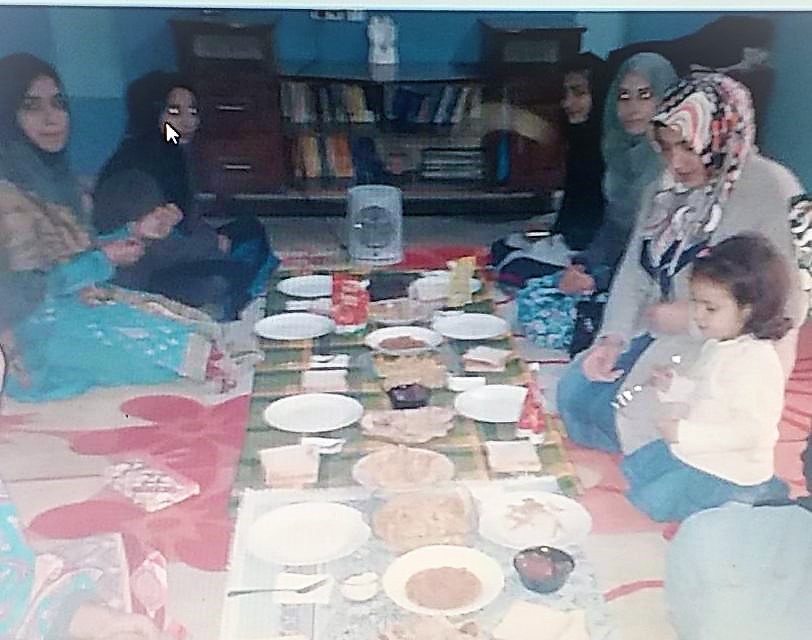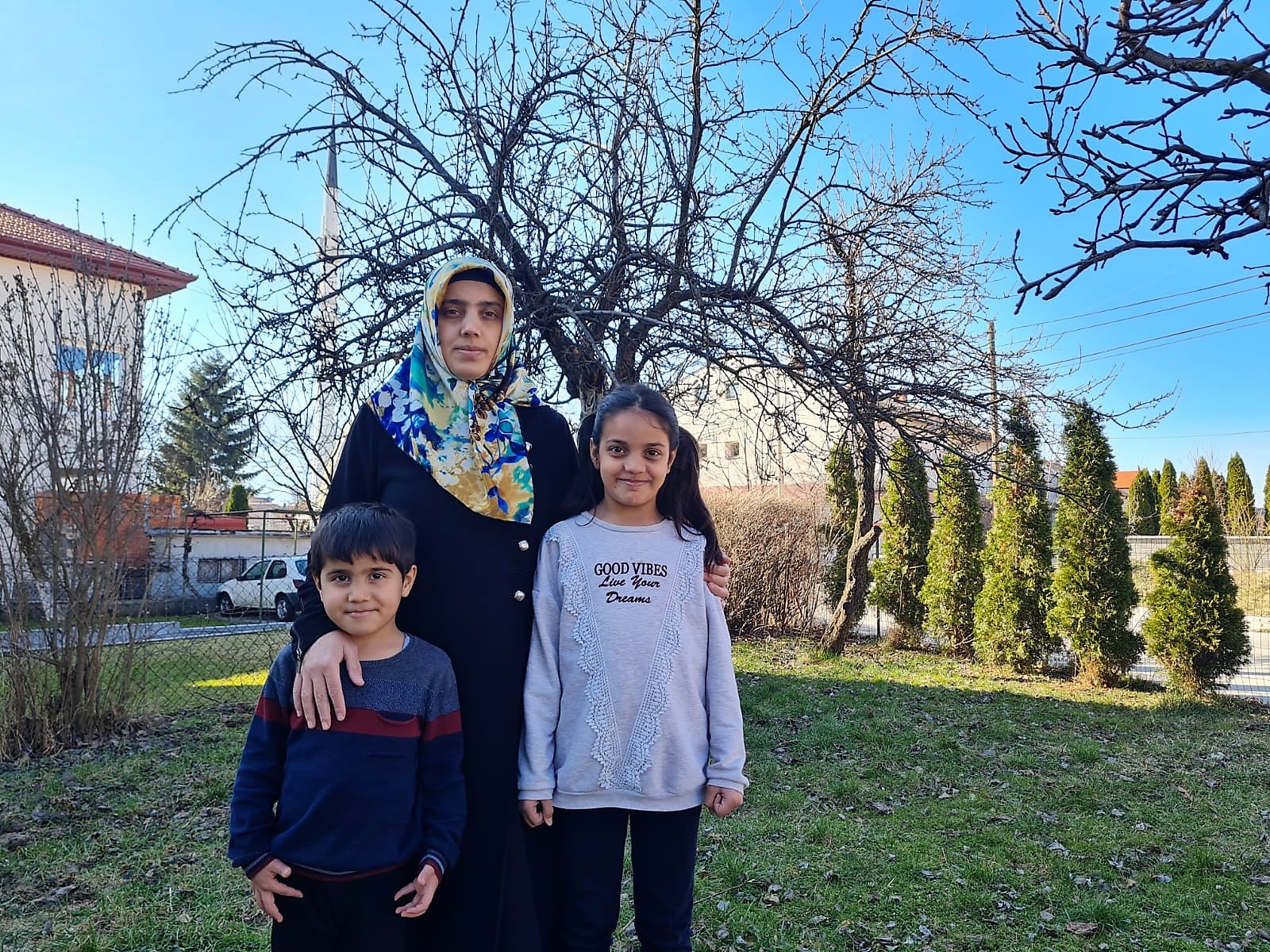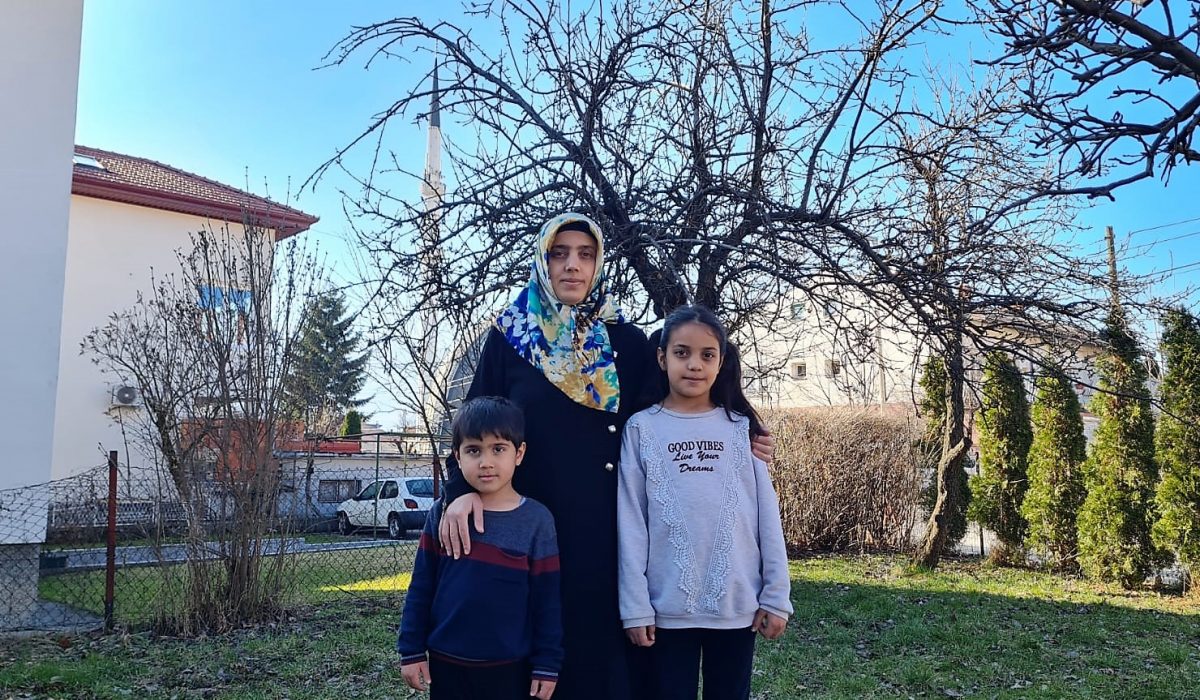PakTurk Schools teacher Zeynep Simsar: Everyone I saw in Pakistan was like a family member

Zeynep Simsar, who left Hacettepe University for Pakistan: The thrill for “emigration” made me even forget missing my family
September 15, 2021
The showcased Turkish teacher on an Islamabad-Sukkur flight
September 17, 2021We publish the second part of our interview with Zeynep Simsar, a former teacher of PakTurk. In this part, Simsar describes her life, years of teaching and experiences in Pakistan. She also narrates the process of leaving what she calls ‘her second homeland’ and her present life.
What kind of country is Pakistan in your opinion? May you talk about the aspects that affect you in terms of people, culture, food and so on?
Pakistan is a hot country. As physical conditions it does not resemble Turkey. Especially someone like me, who hails from the Black Sea region where there is plenty of lush green, looks for greenery. However, as I lived, I learned that the friendships, attachments and associations established there that made those places beautiful and liveable. For this reason, Pakistan became my “second home”. Everyone I saw there was like a family member: Like my uncle, my aunt, my brother, my sister … People there were very gentle, respectful and hospitable. Whenever we were invited to a place, we would receive a treat and a compliment. The hosts gave the priority to their guests in mealtimes. In some houses, tables were set up, treats were served and the host would go to another room so that the guests could enjoy the food comfortably.
In our first Ramadhan in Pakistan, I and my friends from the university were invited to an iftar-and-dinner, and it was our first time to have an iftar with a Pakistani family. A Turkish family living there was also with us. They would taste the food first, and tell us which ones we could or could not eat according to the degree of spiciness. Actually, all the meals were good, but the family helped us because we were not used to the local cuisine at the time. Pakistani dishes are rich in diverse spices. My spice repertoire in that time only included salt, mint, red pepper and black pepper. Later, Pakistani food indispensable for me.
I PUT SO MANY SPICES AND MY SISTER WARNED ME!
Spice-free food does not taste delicious for me anymore. So much so that, I had prepared a meal when I had been to Turkey on vacation. I had not noticed how many spices I had used that my sister felt the need to request, “Please do not cook anything next time!” During another Ramadan, our tutor had invited me to an iftar meal with friends. The table was set and we sat down. We broke our fast with water and dates. Afterwards, we filled our stomachs with pakora and samosa (pastry style fries). They were so delicious! We left the table to perform the evening prayer. When we got back, we saw that the table had been set again with a variety of dishes. It turned out that in Pakistan, a light snack was eaten first and the main meal was eaten after the evening prayer. Since we were accustomed in our culture to eating them in one go, we went full in that snack part. It was a good experience for the next months of Ramadan.
In that geography, the temperature and especially high humidity affect people negatively and slow them down. During the day, when the temperature is highest, between 2 p.m. and 4 p.m., the shops are closed and the streets are quiet. When I first encountered that silence, it felt so different.
–How were your relations with the people of Pakistan, especially with the students and their parents? What are your unforgettable memories with them? May you tell us about the reflections and effects of the social, cultural and spiritual activities you did together?
People could easy guess we were foreigners from the difference of our clothing, but I never felt people looked down on us or excluded us by any gesture, attitude or emotion. On the contrary, they were loving towards the people of Turkey. Whenever we visited the market, the vendors would ask where we were from, and when we said “Turki” (the local pronunciation of the word ‘Turkey’), they would show refer to the love between the two nations by saying “Brother! Brother!”
I HAD FORGOTTEN TO ADD FLOUR TO THE CAKE I BAKED!
During my 6-year student period, I also had students that I helped with their lessons. In that way, I took the first step into teaching and gained experience. Preparing food and treats for students was actually difficult for me, because when I was living with my family, I was not very interested. Even though my mother wanted to teach me, I would not go into the kitchen. That’s why I can say I learned how to cook thanks to my students.

Once I was to bake a cake for my students; when I went to the grocery store to buy the ingredients, I met an older friend and asked her for a recipe. I purchased everything she said and went home, made a mixture and placed it in the oven. While I was waiting for it to be cooked, my housemate came and looked at the cake and realized something was strange when she saw the blend was too molten. She asked me what I had put in the cake. I counted them all. It turned out that I had not added flour. Because the sister I had the market did not tell me about flour. We took the tray out of the oven and baked the cake after adding flour. Fortunately, for the sake of our dear students, it finally rose beautifully.
We had a student from another city. She was staying with us while preparing for the exams. We sat at the table together and started eating the famous Pakistani dish “biryani” from a plate we placed in the middle. After a while she said “Sister, you are eating from the same plate as me.” I did not understand she had meant at first. “What’s wrong with that? We are sisters,” I said. This reply made her very happy. Because we did not consider ourselves different from our students; we lived among them as one of them.
“YOU ARE FORFEITING FROM YOUR CHILD’S TIME FOR US!”
Our months of Ramadhan, iftars and boarding programs were very nice and fun. There were no Internet or television, but we would not know how fast time passed we were with our students. I believe that Almighty Allah facilitated the difficulties in our personal lives since we were with innocent children. For example, when my first child Zehra was a baby, we never experienced such things as fever, insomnia or restlessness during her teething period, thank God. Because that period had coincided with the book retreat I had organized for my students. In those programs, we spent more time with students, played games in the garden in free times, and hosted them at our home overnight. All these were enjoyed by the children, and their enthusiasm for learning and reading increased. After the lessons were over, we used to play games in the school’s garden both with my own child, who would miss me all day, and with my students. When one of my students had said, “Ma’am, you are forfeiting for us from the time you should have given to your own child!”, I was immensely moved. It sufficed for me to see them realize the sacrifices made and appreciate the value and the love we gave to them.
When our work at school was over, we would take a rickshaw or the school’s van with a few teachers to visit the parents. Even though it was difficult in that hot weather, we conducted those visits with enthusiasm and zeal for the well-being of our students. With years of experience, we were able to communicate easily with the mothers of the students and become like a teacher, a mother, or a friend for our students. Mothers could share their problems with us. In that way, sincere bridges were extended between us and them. While I was sitting and chatting with them, I sometimes felt like I was with my friends in my own village. I was like one of them.
THANKS TO OUR BABYSITTER, I LEARNED URDU
When I was a student, I learned a little about Urdu, the official language of Pakistan. Thanks to the vendors in the markets, I would write down what I learned from them in a small notebook and read it every day. However, I was still not at the level to get my exact message through to the families of the students. When I saw in Khairpur Mirs – my and my husband’s first place of posting after our marriage – that a Turkish vice principal could proficiently converse in Urdu with the parents of her students, I was amazed but I also thought, “Can I be as fluent as she is?” After the birth of our first child, we needed a babysitter. Since our only communication was through Urdu, we tried to get our messages through to each other with some mimes and gestures at first, but later on, we could speak Urdu thoroughly.
Thank God I learned Urdu thanks to my little child and with the help of our dear babysitter. This language proficiency facilitated our home visits to parents. I could express my every issue by myself. When parents saw this, their trust and love for us increased even more. I only had such a wish from the heart, but Allah Almighty bestowed me with that. Sometimes I benefited from Urdu in class when the students had trouble understanding the topic in English. This reduced their fear of mathematics.
– How were the feelings and attitude of the people of Pakistan towards the PakTurk Schools and their teachers? Were there any things that made it harder for you to communicate or were things easier than you had expected?
The positive impressions left by our brothers and sisters who had arrived in Pakistan as the firsts played a huge role in the trust of the Pakistani people in our schools. People there have a historical affection towards the country and people of Turkey but it was still a cultural hesitation for the parents to allow especially girls to the school programs where ‘foreigners’ too were present. For this, they had to know us and trust in us. At this point, the home visits played a very significant role. The most challenging thing for me was my longing for my family, but over time I got used to it. There are many situations that may be challenging for people, but as Bediuzzaman said, “The agony disappears and what remains is the flavour (of being delivered from a past trouble).” Now, when I look back at those days, I mostly remember the audacious and emotive aspects, not the tough times I had experienced.
I WOULD NOT BE ABLE TO UNDERSTAND THE ADAGE, “LOVE THE CREATED FOR THE SAKE OF THE CREATOR”
-Did your feelings and opinions change over time when you first went to that country?
I may say Pakistan was the place where I attained the truth of most of the concepts I had heard in Turkey. The more I experienced, lived and observed, the more I managed to learn the terms and emotions like service, emigration, rights of each person originating from their servitude to Allah, Allah’s approval and the like. I realized the true meaning of the saying “The gratitude for every blessing should be befitting with its rate and worth”. The gratitude for knowing mathematics is to teach mathematics, the gratitude for the skill of cooking is to offer food to people, and the gratitude for health is to be with people, enlighten and touch their hearts. Such gratitude also necessitates adding always one more upon everything we do with our lives and prayers…

– What are the effects and contributions of Pakistan on your personal life? Is there anything you say like “I wouldn’t know or learn it if I didn’t come here”?
If I had not gone to Pakistan, I would have not been able to understand the adage “Love what was created for the sake of the Creator”. I would have been unable to understand why the Holy Prophet (may Allah’s peace and blessings be upon him) had endeavoured so hard for his Community, why most of the Companions of the Holy Prophet (may Allah be pleased with all of them) had left Makkah and Madinah for other lands, and what the commandment “Enjoin the goodness and discourage from evildoing ” meant.
-When and why did you leave Pakistan?
In 2016, similar to other Turkish teachers and their families in Pakistan, my and my husband’s work visas were not extended by the government. That was a repercussion of the July 15, 2016 incident on everyone. No matter how much the people in Pakistan stood by us, it would be harder for us to sustain our livelihood without an official job from then on. We had to leave in 2018, regretfully.
-How do you sustain yourself in your current country?
I think of this section of my life as a blessing from Allah. I had left Jan (dear) Pakistan, my home and my second homeland, but in this section of my life, Allah Almighty showed me that service to humanity did not only include teaching. Baking a pastry and offering it as a treat, calling your friends over coffee, listening to their troubles, and sharing what you have with them too are part of this service. It was easy for me to do these while working at a job, but thanks to Him, Allah Almighty has bestowed me with the favour of serving both in the times of abundance and dearth. In a hadith that we all know, the Messenger of Allah (may Allah’s peace and blessings be upon him) said: “Allah Almighty says: I am as my servant’s opinion about Me. When he mentions Me, I am with him. If he remembers me in on his own, I will mention him in a congregation more auspicious than his. If he approaches me by one inch, I will approach him a step, if he approaches me by one step, I will approach him by one fathom. If he comes to me walking, I will run to him. “
I have always heard of this, but I did not know how much I’d understood it. It was a period when the whole city was in lockdown due to the coronavirus epidemic, we could not go to the market whenever we wanted, and we ate the fruit we had with our children by dividing it into 3. One day, I saw an old woman looking for something in the garbage bin across our house. I put pasta, eggs and potatoes in a bag and sent it to the old woman with the children so that the children could learn to share what we have. A short time passed. A friend came by, holding a bag full of various fruits. She brought it thinking I would not be able to go shopping by leaving our little children at home. That day I understood the meaning of this hadith better. We managed to hand out a few things, but Allah Almighty sent His reply with various kinds of fruits. Until this time, we have continued our lives with the material and moral support of my family and friends.
“MAYBE I STUDIED WITH THE SCHOLARSHIPS YOU’D GIVEN!”
Since we are conventional refugees in the country where I am now, we have been receiving aid packages from the United Nations for the last year. I also babysat for a teacher who worked at a school here for about 2 years. The baby was 8 months old when he arrived. He became the new member and joy of our home. Until now, it was difficult to get something from someone as we were used to giving, but the remark of that teacher friend relieved me so much. She said, “Maybe I studied with the scholarships you had given, now it’s my turn. If you need something, don’t be afraid to ask.” It was an expression to tell we deemed each other as sisters.
Another sister too had said, “Zeynep, you prevailed over this process very competently.” She meant the troubles we had experienced during our last years in Pakistan, our departure from there, my extended sojourn with our children in another country while my husband had to stay in another and the material and moral difficulties. I had replied, “Alhamdulillah, the way our sisters and brothers in this Service call and ask about our state, and receiving their material and moral support revive me even more.”
Today’s Zeynep was the Zeynep who grew up with the sacrifices and teachings of her sisters in Service, whom she had met during my first student years in Pakistan. She had gone through difficult times and she hopes she would not easily collapse from this time on. If I had not gone to Pakistan, maybe it would have been more difficult for me to stand firmly against the events happening now.





No Comment.